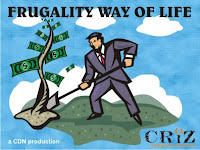Have We Stopped Saving Already?
| August 18, 2009 | Posted by Roshawn Watson under Uncategorized |
 By: Roshawn Watson
By: Roshawn Watson
Well it is finally happening. With the apparent positive turn in the economic tide, the shock and fear that drove consumers’ purse strings and wallets shut is also wearing off. For over a year, people have been talking about a new wave of frugality sweeping through America. However, if this frugality was just a side effect of fear over the decimated economy, will it last now that people are beginning to use that other r-word: recovery?
Three months ago, we asked a pertinent question: ls Recession-Induced Frugality Sustainable? For example, we rediscovered the art of savings. Goldman Sachs predicted 2009 savings rates to be between 6-10%. We even went from record high debt-to-income ratios in 2007 to the American debt load shrinking in 2008, which is the first time American debt has shrunk since 1952. While it would be great for financial temperance to become the new norm, we knew that this unfortunately might be too optimistic. Recent data from the Bureau of Economic Analysis suggests that Americans may be saving less again, as our personal savings rate (as a percentage of disposable income) fell to 4.6% in June, compared with 6.2% in May. Now, it is true that even June’s 4.6% is still a lot better than the negative savings rates we had a few years ago, one must wonder if the drop in savings is a signal our former ways of reckless spending will return.
It is possible to read too much into this though, after all this is just two months’ data. However, even if you believe these two months are indicative of the present trend in spending, there are some recent events that might be confounding this data. For example, May was when some individuals received their federal stimulus checks, which would help spruce up savings for May and make June look particularly worse by comparison. Additionally, 4.6% represents savings as a percentage of disposable income, and June marked the fourth consecutive month that personal incomes decreased. This is partly due to job loss and underemployment. These are indeed important considerations to remember when interpreting the data.
Financial Abstinence Is Not An Option
Additionally, unless you are Daniel Suelo and willing to live in a cave, you have to spend some money. Just like a food addict, total abstinence is never a viable option. It was inevitable that we started spending again. This still doesn’t mean that we couldn’t retain the lessons of frugality, and the lack of retention is what is particularly troubling. Programs such as Cash for Clunkers that induce people to trade in their working cars to purchase new cars that they most likely cannot afford appear to be a step in the wrong direction. Such debt-driven spending may be great for the auto industry and even temporarily for the overall economy, but as Suze Orman said nearly a year and a half ago, what you have to be concerned about is your personal economy.
Lastly, if you like this post, please subscribe (see upper right-hand corner), Mixx it, Propel it, Stumble it, and tag it on Delicious. Also, click here to get my eBook FREE
Related Posts
ls Recession-Induced Frugality Sustainable?
Thrift Paradox – Is Frugality Hurting The Economy
For The First Time, American Debt Shrinks
Copyright 2012, Roshawn Watson, Pharm.D., Ph.D. All Rights Reserved.







Most people are thrifty because they have nothing to spend, since so many are out of work, out of unemployment benefits and out of money. I have always been thrifty and save over 40% of my gross. How do I do it? Small house (900 sf), economical car, no idiotic expenses (ie: flat screen HDTV, boat, motorcycle, surround-sound system, etc, etc, etc), inexpensive vacations, the list goes on. It can be done, but the average American has been so ingrained to believe that whoever has the most toys win, or bigger is better (just watch HGTV), that frugality will lose out every time.
Sam, I agree that if you act wisely with your money, you can definitely come out way ahead. Most people really do just waste so much of their income, it is quite sad. For those who are frugal and yet still have money as you point out, they are positioning themselves for a lot of financial growth. The big caveat is that they need to buy assets with their income. Merely saving it is not necessarily the best use of money either.Thanks for comment.
Say it isn't so. Surely, we are not about to emerge from this recession just as financially reckless as ever!
Unfortunately I think it is imminent that Americans are going to stop saving and go back to their old spending habits. Hopefully this recession has created at least a few permanent converts to the frugal side.
Kyle,I agree with you. These seasons of booms and busts are cyclic, and the fear-induced good habits only last so long. What's interesting is that so many people have referred to this as the Great Recession (a not so subtle reference to the Great Depression). The Great Depression scared the living daylights out of so many people that it changed them permentantly. It literally imprinted a generation with frugality. Who knows if some of that will be seen today with the Great Recession!
Saving doesn't happen in a vaccum.If you have no job, you can't save.
You absolutely cannot save if you cannot bring in anything. I completely agree there. This point was alluded to in the article when explaining that incomes have dropped in June which could explain why savings dropped. However, over 90% of people (in most parts of the country) still have jobs. The article focuses on their saving habits.